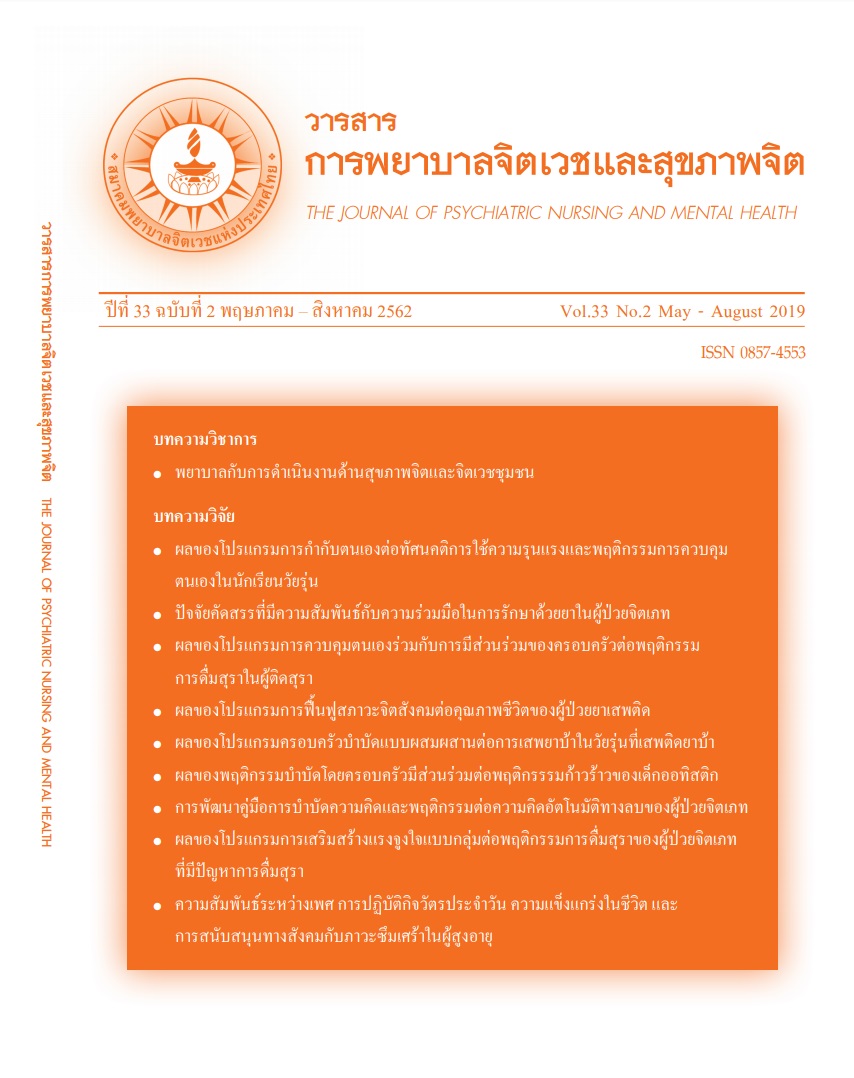ผลของโปรแกรมการเสริมสร้างแรงจูงใจแบบกลุ่มต่อพฤติกรรมการดื่มสุราของผู้ป่วยจิตเภทที่มีปัญหาการดื่มสุรา
Main Article Content
บทคัดย่อ
วัตถุประสงค์: เพื่อเปรียบเทียบ 1) พฤติกรรม การดื่มสุราของผู้ป่วยจิตเภทที่มีปัญหาการดื่มสุรา ก่อนและหลังได้รับโปรแกรมการเสริมสร้างแรง จูงใจแบบกลุ่ม 2) พฤติกรรมการดื่มสุราของผู้ป่วย จิตเภทที่มีปัญหาการดื่มสุราระหว่างกลุ่มที่ได้รับ โปรแกรมการเสริมสร้างแรงจูงใจแบบกลุ่มกับกลุ่ม ที่ได้รับการพยาบาลตามปกติ
วิธีการศึกษา: เป็นงานวิจัยกึ่งทดลองกลุ่ม ตัวอย่างเป็นผู้ป่วยจิตเภทที่มีปัญหาการดื่มสุรา จำนวน 46 คน ซึ่งมีคุณสมบัติตามเกณฑ์ที่กำหนด และมารับบริการในแผนกผู้ป่วยนอก โรงพยาบาล จิตเวชสระแก้ว ราชนครินทร์ ได้รับการจับคู่กลุ่ม ตัวอย่างด้วยคะแนนปัญหาการดื่มสุราแล้วถูกสุ่ม เข้ากลุ่มทดลองและกลุ่มควบคุมกลุ่มละ 23 คน กลุ่มทดลองได้รับโปรแกรมการเสริมสร้างแรงจูงใจ แบบกลุ่ม กลุ่มควบคุมได้รับการพยาบาลตามปกติ เครื่องมือที่ใช้ในการวิจัย ได้แก่ 1) โปรแกรมการ เสริมสร้างแรงจูงใจแบบกลุ่ม 2) แบบประเมิน พฤติกรรมการดื่มสุรา และ 3) แบบวัดความพร้อม ในการเปลี่ยนแปลงและความต้องการในการรักษา เครื่องมือทุกชุดผ่านการตรวจสอบความตรงเชิง เนื้อหาจากผู้ทรงคุณวุฒิจำนวน 5 คน เครื่องมือชุดที่ 2 ได้รับการตรวจสอบความเที่ยงโดยวิธีทดสอบซ้ำพบค่าสัมประสิทธิ์สหสัมพันธ์ของเพียร์สันเท่ากับ .87 วิเคราะห์ข้อมูลโดยใช้สถิติที
ผลการวิจัย 1. พฤติกรรมการดื่มสุราของผู้ป่วยจิตเภท ที่มีปัญหาการดื่มสุราหลังได้รับโปรแกรมการ เสริมสร้างแรงจูงใจแบบกลุ่มต่ำกว่าก่อนได้รับ โปรแกรมอย่างมีนัยสำคัญทางสถิติที่ระดับ .05 2. พฤติกรรมการดื่มสุราของผู้ป่วยจิตเภท ที่มีปัญหาการดื่มสุรากลุ่มที่ได้รับโปรแกรมการ เสริมสร้างแรงจูงใจแบบกลุ่มลดลงต่ำกว่ากลุ่มที่ ได้รับการพยาบาลตามปกติ อย่างมีนัยสำคัญทาง สถิติที่ระดับ .05
Article Details
บทความที่ได้รับการตีพิมพ์แล้ว เป็นลิขสิทธิ์ของสมาคมพยาบาลจิตเวชแห่งประเทศไทย
เอกสารอ้างอิง
ทวี วิสาระพันธ์. (2551). การบำบัดเพื่อเสริมสร้างแรงจูงใจต่อการเปลี่ยนแปลงพฤติกรรมของผู้ป่วยที่มีความผิดปกติทางจิตและพฤติกรรมเนื่องจากแอลกอฮอล์. ปริญญา มหาบัณฑิต, สาขาการพยาบาลสุขภาพจิตและจิตเวช, คณะพยาบาลศาสตร์, มหาวิทยาลัยขอนแก่น.
นพวรรณ เอกสุวีรพงษ์ และนารัต เกษตรทัต. (2550). ปัจจัยที่มีผลต่อความไม่ร่วมมือในการใช้ยาของผู้ป่วยจิตเภท ณ โรงพยาบาลสวนสราญรมย์. วารสารสมาคมจิตแพทย์แห่ง ประเทศไทย, 52(4), 412-418.
พัชชราวลัย กนกจรรยา และเพ็ญพักตร์ อุทิศ. (2556). ผลของโปรแกรมการบำบัดแบบผสมผสานแบบโดยการเสริมสร้างแรงจูงใจร่วมกับการปรับเปลี่ยนความคิดและพฤติกรรมต่อภาวะซึมเศร้าพฤติกรรมการเสพสุราในผู้เสพติดสุรา. วารสารการพยาบาลจิตเวชและสุขภาพจิต, 27(2), 56-68.
เพ็ญพักตร์ ดารากร ณ อยุธยา. (2556). ความสำเร็จ ในการเลิกสุราของผู้ป่วยสุราที่มีโรคร่วม. วารสารการพยาบาลจิตเวชและสุขภาพจิต, 27(3), 1-15.
สาวิ ตรี สุ ริ ยะฉาย. (2556). การบำบัดผู้ป่วยสุราที่มีโรคร่วมทางจิตเวชที่ประสบความสำเร็จ. วารสารการพยาบาลจิตเวชและสุขภาพจิต, 27(2), 1-15.
สุมิตรา ศรสุวรรณ, สุนทรี ศรีโกไสย และพัทธยา สอาดอาวุธ. (2555). ผลของโปรแกรมการบำบัดเพื่อเสริมสร้างแรงจูงในผู้ป่วยจิตเภทที่มีการใช้สุราร่วม. วารสารสุขภาพจิตแห่ง ประเทศไทย, 20(3), 144-153.
หทัยวัน สนั่นเอื้อ. (2552). การใช้สารเสพติดในผู้ป่วยโรคจิตเภทที่เข้ารับการรักษาในหอผู้ป่วยจิตเวช โรงพยาบาลกาฬสินธุ์. วารสารโรงพยาบาลร้อยเอ็ด, 16 (1), 23-31.
Baker, A. L., Hiles, S. A., Hide, T. L., & Lubman, D. I. (2012). A systematic review of psychological intervention for excessive alcohol consumption among people with psychotic disorder. Acta psychiatrica scandinarica, 126, 243-255.
Carey, K. B., Leontieva, L., Dimmock, J., Maisto, S. A., & Batki, S. L. (2007). Adapting motivational interventions for comorbid schizophrenia and alcohol use disorders. Clinical psychology science and practice, 14(1), 39-57.
Curran, G. M. et al. (2008). The association of psychiatric comorbidity and use of emergency department among persons with substance use disorder: An observational cohort study. BMC Emergency Medicine, 8, 17.
Green, A. I., Drake, R. E., Brunette, M. F., & Noordsy, D. L. (2007). Schizophrenia and co-occurring substance use disorder. American journal of psychiatry, 164(3), 402-408.
Heinz, A., Mann, K., Weinberger, D. R., & Goldman, D. (2001). Serotonergic dysfunction, negative mood states, and response to alcohol. Alcoholism: Clinical and Experimental Research, 25(4), 487-495.
Horsfall, J., Cleary, M., Hunt, G. E., & Walter, G. (2009). Psychosocial treatments for people with co-occurring severe mental illnesses and substance use disorders (dual diagnosis): A review of empirical evidence. Harvard reviewpsychiatry, 17(1), 24-34.
Hughes, E. (2009). Dual Diagnosis: An integrated approach to care for people with co-occurring mental health and substance use problems. In R. Newell & K. Gournay (Eds.), Mental health nursing an evidence-based approach (pp. 131-150). London: Churchill living stone.
Jablensky, A. (2000). Epidemiology of schizophrenia: the global burden of disease and disability. European Archives of Psychiatry and Clinical Neuroscience, 250, 274–285.
John, U. R., Driessen, D., Wetteriling, M., & Dilling, H. (2003). Motivational intervention: An individual counseling vs a group treatment approach for alcohol dependence inpatients. Alcohol and Alcoholism, 38(3), 263-269.
Martio, S., Carroll, K., & Kostas, D. (2002). Dual Diagnosis motivational intervention: A modification of motivational interviewing for substance-abusing patients with psychotic disorders. Journal of Substance Abuse Treatment, 23, 297-308.
Miller, W. R., & Rollnick, S. (2002). Motivation interviewing: Preparing people for change. New York: Guilford Press.
Miller, W. R., & Tonigan, J. S. (1996). Assessing drinkers’ motivation for change: The stage of change readiness and treatment eagerness scale (SOCRATES). Psychology of addictive behaviors, 10, 81-89.
Salyers, M. P., & Mueser, K. T. (2001). Social functioning, psychopathology, and medication side effects in relation to substance use and abuse in schizophrenia. Schizophrenia Research, 48, 109-123.
Santa Ana, E. J., Wulfert, E., & Nietert, P. J. (2007). Efficacy of group motivational interviewing (GMI) for psychiatric inpatients with chemical dependence. Journal of Consulting and Clinical Psychology, 75, 816-822.
Suktrakul, S. (2009). The effect of alcohol craving control program on alcohol consumption in alcohol dependence. Doctoral dissertation, Nursing science Faculty of Nursing, Chulalongkorn University.
Wagner, C. C., & Ingersoll, K. S. (2013). Foundation of motivation interviewing groups. In C. C. Wagner, & K. S. Ingersoll (Eds.), Motivational interviewing in group, (pp. 297-313). America: Guilford Press.
Yalom, I. D., & Leszcz, M. (2005). The theory and practice of group psychotherapy. (5th ed.). New York: Basic Books.


